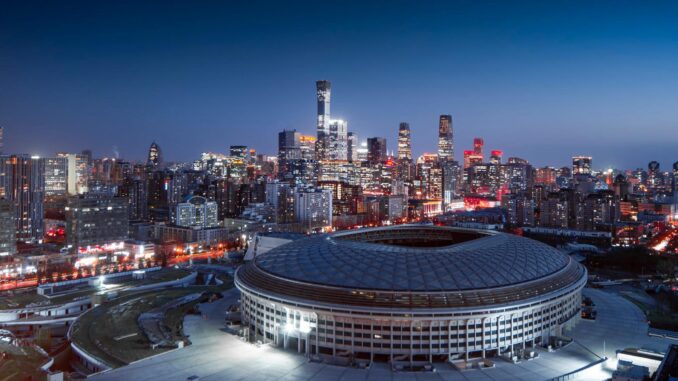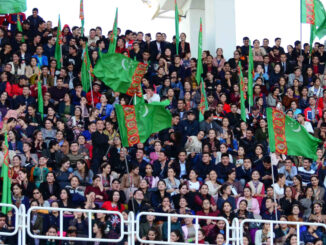
That Australia will face Argentina, in Beijing of all places, in a re-match of their thrilling Round of 16 encounter at last year’s World Cup, is notable for a number of reasons.
It speaks to the growing stature of Australia after their World Cup heroics in Qatar that the Argentine Football Federation sought out the Socceroos as an opponent for their tour of East Asia.
Graham Arnold was only too happy to point out that during a recent catch up with Argentina’s coach Lionel Scaloni in Doha, the 45-year-old lauded the Socceroos’ efforts in Qatar, claiming Arnold’s side were the toughest they faced on their way to claiming the coveted World Cup trophy.
“If you want a seat at the world football table, these are the things you’ve got to do,” Football Australia CEO, James Johnson, said this week.
“You’ve got to host big competitions like the Women’s World Cup. You’ve got to play big opposition like Argentina, you’ve got to play at Wembley. On the women’s side, you’ve got to play the best in the world, you’ve got to play the United States.
“If you look at all these examples in isolation, you might not see the strategy. If you bring it all together, though, there is an undertone, which is, ‘We’re Australia, we’re here, we’ve got a seat now and we want to stay at the world table.’”
There are also fascinating geopolitical undertones given the previously frosty relations between Australia and China at the highest politics levels, with China imposing crippling tariffs and restrictions on some of Australia’s biggest export commodities in response to Australia’s criticism of China and it’s handling of the response to the COVID-19 pandemic.
In truth, there had been a simmering anti-China sentiment bubbling in Australia for quite some time, particularly under the previous right-wing Liberal government.
With relations thawing in recent months – Australia’s Minister for Trade and Tourism, Don Farrell, recently visited China in a much publicised attempt to have some of the tariffs and restrictions overturned – the match is seen as an ideal opportunity for the two countries to continue those discussions, with football as the conduit.
At a time when Football Australia are seeking a larger slice of funding from all levels of government, particularly for the building of a long overdue Home of Football for Australia’s national teams, they are only too happy to showcase football’s strength in offering the perfect platform for international diplomacy.
“We’ve seen our [trade] minister, Don Farrell, who’s been over in China recently, we’ve seen our prime minister who’s started to try to open up channels with the highest level officials in China,” Johnson continued.
“We’ve seen [foreign minister] Penny Wong, obviously, try to do the same. There certainly is interest from the federal government. I think there will be government officials at the game in some shape or form.
“That’s the competitive advantage that we have against the AFL and the NRL because, like government, we exist locally but also globally – and through football, we can open up some channels and dialogue for our governments.”
But what is also notable about Australia’s inclusion in the fixture is who is not playing.
While the Socceroos face the world champions in Beijing’s glistening new Workers’ Stadium in downtown Beijing, on Xi Jinping’s 70th birthday no less, the home nation is nowhere to be seen.
In fact, Aleksandar Janković’s side will be busy preparing for their own friendly 24 hours later in Dalian – against Myanmar.
At the height of the Chinese boom in the last decade, the idea that Argentina would travel to China and play anyone other than the home nation would’ve been a fanciful one.
The fact they are is another illustration of how far Chinese football has faded in the past five years, firstly as a result of the government imposed financial restrictions to curb spending, and secondly by the COVID-19 pandemic.
While there are signs of life in Chinese football this year with the return of the Chinese Super League in all its home and away glory, and free from any crowd restrictions, it’s still a long way from the glory days of the mid-2010s when China dominated the discussion.
The advent of the China Cup, an annual friendly tournament designed to attract some of the best football nations to China, saw nations like Wales, Iceland, Uruguay and Croatia all make the trip east for a series of friendly matches with the promise of bigger and better things to come.
The brainchild of the Dalian Wanda Group, who around the same time bought a significant stake in Atletico Madrid as well as becoming FIFA’s first Chinese sponsor, the annual tournament was part of a plan to improve the standard of the national team, by giving them more competitive matches against the world’s best teams.
“While China has many things to do to make its national team more competitive, the experience of playing in international A matches will be of great help,” Wanda Group Chairman Wang Jianlin said at at the time.
“We hope to provide a platform for the Chinese national team to improve through drills against world powers and thus contribute to the game’s rise in China.
“The China Cup will invite countries from Europe and the Americas whose teams have the highest skill levels, enabling international football stars to play in front of a vast number of Chinese soccer fans on the stage of the China Cup.”
A report in the China Daily further claimed the tournament: “…will be developed into an eight-team marquee event in the future, with profit potential in media rights sales, ticketing and merchandising campaigns.”
Yet by 2019, at a time when the government was putting the handbrake on football spending, the tournament featured just one top tier nation, Uruguay, with Thailand and Uzbekistan filling out the program; a long way from the tournament promised just years earlier.
In an alternate reality, it’s not hard to imagine a scenario where Argentina visit Beijing as part of an extravagant China Cup offering that sees some of the world’s biggest nations vie for a slice of the ‘China Pie’ as it were, with the home nation front and centre of those plans.
That they’ll instead be readying themselves for a series of lower-profile friendlies against Myanmar and Palestine, ironically in Dalian, is symbolic of how far Chinese football has declined in just a few short years.
But Mark Dreyer, the author of Sporting Superpower: An Insider’s View on China’s Quest to Be the Best, says he isn’t reading too much into China’s non-involvement.
“It’s fairly common these days for international friendlies to be played in third countries, so I wouldn’t read too much into that,” the told The Asian Game.
“But Argentina is the big attraction here. I think there would also be some resistance internally for Argentina to play China because, although this is a meaningless friendly in terms of results, a China-Argentina game would still put pressure on China to deliver a solid performance – and they are miles away from Argentina’s level.
“The vast majority of Chinese fans want to see Messi and the world champions – not their own underperforming team – and they want to see Argentina play attractive football and, hopefully, score a bunch of goals.
“It would be strange if you had Chinese football fans cheering against their own team, and the authorities wouldn’t like that. It also wouldn’t look great for China to be on the end of a cricket score.”
The fact that Argentina are still making the trip, however, shows the lure of the Chinese market is still as strong post-COVID as it was beforehand, according to Dreyer.
“Make no mistake, this is a money-making scheme for the AFA, with Australia simply along for the ride,” he said.
“I haven’t yet heard how much money Argentina are being paid to come to China, but they would have had their pick of countries for their World Cup and Messi farewell tour and the compensation will certainly make it worth their while.
“Things have been a little slow to recover on the international sporting events front in China, and part of that is down to a lack of trust in the market after three years of COVID-Zero.
“This year’s Asian Cup was already relocated from China to Qatar, F1 decided to hold off for another year even though China had reopened, Premier League teams are heading to the US – not China – this summer, and NBA preseason games won’t return to China for at least another year.
“But this game is a good first step. It’s likely to be a sellout at whatever ticket price levels are decided and, short of a drab 0-0, will be a successful event that gives some positive momentum to the sports industry here.
“Things will recover, just not at the speed that China wants. Watch for 2024 to be when things might return to pre-pandemic levels.”




